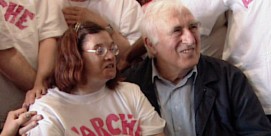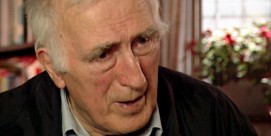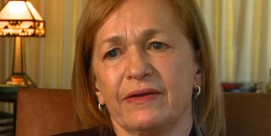In This Episode << SLIDE LEFT TO SEE ADDITIONAL SEGMENTS
Churches and the Mentally Ill
DEBORAH POTTER, correspondent: On Tuesdays and Thursdays, the vans from Holy Comforter Episcopal Church make the rounds in southeast Atlanta.
DRIVER: Today we’ll pick up between 60 and 70 people.
POTTER: The church provides a day center for people with mental illness and other disabilities.
KENNETH (getting off the van): Good morning, everybody.
POTTER: At first glance, it looks like any other assistance program. People line up for free clothing and toiletries from a stockpile of donations.
VOLUNTEER: Do you need a toothbrush?
WOMAN: Yeah.
POTTER: They share meals prepared by volunteers—breakfast and lunch.
REV. MICHAEL TANNER (Vicar, Episcopal Church of the Holy Comforter): Is this your first time here?
 MAN AT DOOR: No, second.
MAN AT DOOR: No, second.
REV. TANNER: Well, I’m Mike.
POTTER: While some participants go to counseling or therapy, others work with their hands in a supervised art program.
EMILY SEABURY: I really love this church. It makes me feel good about myself.
SYTHA HOLT: You come, you read, you get to know people better. You get to understand your illness, you know, just have a good time.
POTTER: But the heart of the program isn’t the handouts or even the activities.
HAKIN MCDUFFIE: The prayer and the inspiration from the prayers inspire me to come.
RICHARD CUMMINS: When I pray it makes me feel better, makes me feel like things will be all right, you know. Try to calm down and pray instead of being worried, anxious like I used to be all the time.
POTTER: The church garden grows and sells vegetables and plants to help defray the cost of the day program, which is mostly paid for by the Episcopal diocese of Atlanta, foundation grants, and donations.
 REV. TANNER: What I see coming to us and joining us is a group of people who have been knocked down all their lives and who are just remarkably joyous and remarkably full of faith. They get it that God loves them and that their suffering is just part of life, and God loves them through it, and they love each other through it.
REV. TANNER: What I see coming to us and joining us is a group of people who have been knocked down all their lives and who are just remarkably joyous and remarkably full of faith. They get it that God loves them and that their suffering is just part of life, and God loves them through it, and they love each other through it.
POTTER: One out of every ten people will experience a severe and persistent mental illness at some point in life, experts say. For decades society shut those people away in institutions. But now they’re more visible on the streets and in group homes, and faith communities have been challenged to respond.
Holy Comforter responded 15 years ago when a group home opened nearby and the priest at the time invited the residents to church. Today, almost two-thirds of the congregation is made up of people with mental illness—including bipolar disorder, clinical depression, and schizophrenia—who worship together…
NOON SERVICE: Lord, we thank you.
POTTER: …and pray together.
NOON SERVICE: Father God, we ask that you wash us clean and keep us safe and protected. Father God, protect each and every member of our church right now, in Jesus’ name. Amen, Amen.
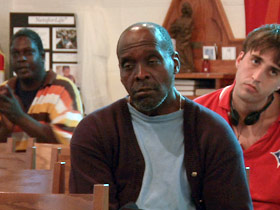 POTTER: Programs like this are rare for many reasons, including fear that people with mental illness will be disruptive or disturbing.
POTTER: Programs like this are rare for many reasons, including fear that people with mental illness will be disruptive or disturbing.
REV. TANNER: We have a lot of things that we imagine about mental illness that aren’t true. We imagine that people with mental illness are more violent than the rest of us. They are not. They are less violent than the rest of us. They’re more vulnerable than the rest of us, but we’re afraid.
POTTER: The stigma attached to mental illness keeps many people silent about their suffering, and researchers at Baylor University found in a limited study that a third of those who seek help from their pastors don’t get it.
REV. ADENET MEDACIER (Shalom Community Church, Miami): They might say that it’s from an evil spirit. It’s an evil spirit and it has to be cast out. You have to pray more. And that approach, of course, would only result in that illness never being—you know, the core of that issue never even being touched.
POTTER: At this government-sponsored conference in Washington, faith communities were encouraged to partner with mental health groups—a recognition that both medicine and spirituality have a role to play in dealing with mental illness.
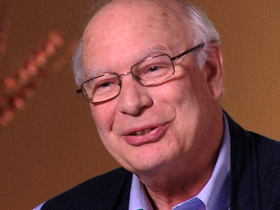 REV. CRAIG RENNEBOHM (Mental Health Chaplaincy): Faith can give us a sense of hope. It provides a horizon of possibility in our lives. Faith speaks to what’s deepest and best in us each, and faith helps us to explore our connections with one another.
REV. CRAIG RENNEBOHM (Mental Health Chaplaincy): Faith can give us a sense of hope. It provides a horizon of possibility in our lives. Faith speaks to what’s deepest and best in us each, and faith helps us to explore our connections with one another.
POTTER: Craig Rennebohm ministers to people with mental illness in Seattle. He’s a former pastor in the United Church of Christ.
REV. RENNEBOHM: I think all of our traditions talk about loving our neighbor. Virtually every religious, spiritual tradition has scriptures about compassion and about healing. So it’s not a matter of whether we do these things. It’s sort of extending our capacity to support healing and respond to suffering by including those who experience mental health issues.
POTTER: Inclusion is the key at St. Catherine-St. Lucy Roman Catholic Church in suburban Chicago. Twice a month for more than 30 years, people with mental illness have come together here for prayer and conversation with volunteers.
CONNIE RAKITAN: It’s also time to give praise and worship to our God because we’re here. We made it. Whatever our day brought, we made it, and without Him we never would have made it.
POTTER: Connie Rakitan founded the program and still runs it today, helping to design worship that’s welcoming to all.
RAKITAN: Walking into a church with a long service and a long sermon and lots of music and lots of people could just be so overwhelming that it’s just not doable.
 Worship: Praise our God, who lavishly loves us.
Worship: Praise our God, who lavishly loves us.
RAKITAN: We would never, ever use a healing passage, because we would not want to set somebody up for an unrealistic disappointment, because the fact is not everybody gets cured. So it’s not like, you know, just join a church and everything’s going to be hunky dory.
POTTER: But programs like Faith and Fellowship do help some people.
RAKITAN: Their families might be alienated from them or estranged or whatever. They might not have work communities. What do they have left but their faith in God?
RUTH RESKEY: I fought depression for a long time, but I’ve gotten through that, and I just seem to take it day by day.
POTTER: And the faith part of it helps?
RESKEY: Faith helps. Faith helps greatly. And coming to the church where everybody knows me, acknowledges that you’re there—that helps.
JACKIE BURKS: Why I feel so comfortable here? Because we all one family and we love each other.
JOHN SCHULLER (Volunteer): We love it, too. You know, it feels like home. I don’t know how much better to say it, but everyone’s welcome here, you know, and it’s a marvelous, marvelous spirit. I don’t know if you can feel it, you know, but it’s palpable.
POTTER: More faith communities are beginning to reach out to people with mental illness. But change comes slowly, partly because many pastors feel unprepared to lead the way.
REV. RENNEBOHM: Not every pastor has to be the out-front leader. I think in every congregation there are families and individuals who have experienced mental illness or mental health issues who can be the champions in their local faith community.
RAKITAN: I think that there’s a long way to go, and I think one of the keys that’s going to move us even more forward is for churches to recognize that relationships are the key and people want to be needed, wanted, loved, and appreciated.
POTTER: Here they are.
BURKS (singing): Amen, amen…
POTTER: For Religion & Ethics NewsWeekly, I’m Deborah Potter in Oak Park, Illinois.



